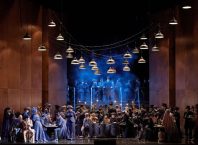
Oded Littman and Zvi Sahar are looking for a hero – aren’t we all? Their search led them to create Tonight: Oedipus – a darkly seductive and entertaining version of Sophocles’ Oedipus Rex showing monthly at Hasimta Theatre, with the next performances on April 22 & 23. As fate would have it, I saw the play on March 4 – the final night of the popular Israeli reality show “HaAh HaGadol 2” (Big Brother).
The stage is set like a cabaret stage, with lights on the black floor and a classic white pillar off to one side, as a nod to its classic origins. A woman (Karin Marom) in a glittering black evening gown enters pulling a long red cable; she sets a microphone on the stand and turns her back to the audience. A man (Zvi Sahar) approaches the mic, dressed in black with a bow tie; he is clearly the Master of Ceremonies for this evening. “Out there, outside this room,” he says, with an enigmatic, almost manic smile, “the situation is not so good…politics, the economy, after all, even morals are a sort of problem – perhaps even…tragic.” He giggles.
But don’t worry, he pulls out a dog-eared copy of Oedipus Rex (in Aharon Shabtai’s translation) and assures the audience that they are about to see “Sophocles original.”
If reality is a form of entertainment and tragedy brings on the giggles, one might well ask: “Where have all the good men gone and where are all the gods?” (sung by Bonnie Tyler circa mid-80s from the soundtrack to the movie Footloose) Out there, our reality is far removed from the world of classic Greek drama, where human fate is determined by the gods. What relationship can we have to these texts and the issues they raise, in the context of theatre and our lives? In the absence of gods, is reality created by the presenters, the MCs in control of the evening and our fate? Can there be a contemporary hero, and is Oedipus (Nadav Nates) a hero, or just another player, cleverly manipulated by the MC?
The opening moments of Tonight: Oedipus led me to expect an evening offering a critique of contemporary Israeli culture in the form of a satiric cabaret, but Littman and Sahar, who conceived and adapted the play, have nothing quite so simple in mind. It is indeed the original text as written by Sophocles, with some crucial exceptions – the parts of the chorus have been re-written as the cynical commentary of the controlling MC. Under Littman’s direction, this play in which so much depends on sight, blindness and knowledge in its many forms, turns Sophocles’ “original” inside out. Everything is revealed and displayed on the surface, from props to actors portraying different characters within the play. As the MC and the woman he calls Motek take on different roles, his overt manipulation of Motek and Oedipus is glaringly explicit.
The post-modern self-consciousness ironically draws the audience into complicity. We already know the play, and in our implicit dialogue with the MC, we are “in the know”, as are the characters in the play. Yet in the MC’s direct address, the audience becomes a character as well – we are the people of Thebes. The characters in the play, from Creon and Jocasta (Marom), to blind Tiresias and the shepherd of Laius (Sahar), and the final messenger (Marom) – they are always also the MC and Motek, and as such, always aware of their role in the drama and the reaction of the audience and Oedipus. This thrusts the all-knowing audience into a position of identification with Oedipus – to a certain extent, we do feel what he feels, as both audience and Oedipus are manipulated by the MC. The distancing mechanisms in the structure of the play are the ones that draw the audience closer.
Sahar is the ultimate actor/manipulator, delivering a virtuoso performance. His ability to immerse himself in the character to an insane degree – his facial muscles grow slack and his body weak as the old and weary Tiresias – and then snap out of it in the blink of an eye is mesmerizing. As Tiresisas, he is the embodiment of blindness and insight, as the shepherd, he is just one of the guys, eager to help Oedipus – and yet, he is the entertainer, holding the audience as he holds the mic, shaping destiny with the power of his voice and words.
Karin Marom exudes sexuality, vulnerability and power. The onstage relationship between Sahar and Marom is fascinating in all its manifestations, transformations and subtle shifts in the balance of power. The MC may control destiny, but Motek is the one who elicits our empathy. And as for Oedipus (Nadav Nates) – is he a naïve pawn in this game? Or is he a hero?
Tonight: Oedipus based on Sophocles’ Oedipus Rex
Concept and adaptation: Oded Littman and Zvi Sahar
Director: Oded Littman
Set and costume design: Aya Zeiger
Music: Nitzan Shahar, Shlomi Mantzur
Movement: Dana Yahalomi
Assistant directors: Anahel Ben Avraham, Ran Yatim
Lighting: Yair Vardi
Performances: April 22 at 21:00, April 23 at 21:30, Tickets: 03-6812126
Hasimta Theatre, 3 Mazal Dagim, Yafo
AYELET DEKEL






[…] Shanit – From Enemy to Lover – The Arab-Hebrew Theatre of Jaffa Oded Littman and Zvi Sahar – Tonight Oedipus – Hasimta […]
Comments are closed.